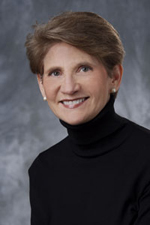 |
Virginia Tilden, D.N.Sc. |
 |
Diane Brage Hudson, Ph.D. |
 |
Marisa Headley |
The facility will sit just north of the UNMC College of Dentistry at 40th & Holdrege streets and east of the Maxwell Arboretum on the east campus of the University of Nebraska-Lincoln.
Construction of the new building is tentatively scheduled to begin October 2010 with completion estimated in February 2012, which is when the lease expires on the downtown Commerce Court Building where the nursing division is temporarily housed.
“I am thrilled at the prospect of proper space for our Lincoln division,” said Virginia Tilden, D.N.Sc., dean of the UNMC College of Nursing. “The division is most deserving of a new building because of its vital role in preparing the nursing workforce for the surrounding area, including future faculty for Nebraska’s nursing schools.
“This facility will let us strategically expand enrollments and programs and will give faculty and students the 21st century teaching, learning and research environment they deserve.”
The new facility will help the college prepare more nurses with bachelor’s degrees, meet increasing student demand and reduce the serious nursing shortage in Nebraska. It also will help attract and prepare more nurses with master’s and doctoral degrees in specialty areas, as well as for leadership and faculty positions.
The Lincoln division is attractive to applicants in large part because of its collegiate environment, Dr. Tilden said. Each year, the Lincoln division receives many more qualified applicants than it can admit to its bachelor of science in nursing program. It can admit about 80 applicants a year – which is only about 40 to 50 percent of those who apply every year.
By 2020, with the new building, Dr. Tilden estimated the college will be able to admit 64 more qualified applicants — 40 in the bachelor’s program, 16 in the master’s program and eight in the doctoral program. Seven faculty and six researchers also will be added, she said.
The multi-story structure will contain 29,136 net square feet — which is about 80 percent more space than the current Lincoln facility has.
It will feature classrooms and class labs with advanced teaching technology, student and faculty interaction areas, faculty offices and space for nursing research programs.
|
|
“We’re delighted the Board of Regents approved this investment in improving the health of Nebraska through world-class nursing education,” Dr. Maurer said. “It will make a lasting, positive impact on Nebraska. We are fortunate to have the regents’ support and the support of the university and community to make this important project happen.”
Nebraska, like other states across the country, is in the midst of an increasing demand for nurses to fill a shortage that is expected to intensify as baby boomers age and the need for health care grows.
The nursing shortage is not a result of low interest in nursing careers, Dr. Tilden said, but rather applications to nursing schools exceed capacity of educational programs.
Although about 20,000 registered nurses are employed in Nebraska, most hospitals and nursing homes report staff shortages and many unfilled registered nurse positions. This shortage will worsen in the coming years as nurses retire and as the baby boomers age and require more medical care. By 2020, it is estimated the state will have a deficit of almost 4,000 registered nurses.
Diane Brage Hudson, Ph.D., acting assistant dean for the UNMC College of Nursing Lincoln Division, said a state-of-the-art facility situated on a campus environment along with expanded nursing research will help attract the best faculty.
“Increasing the number of faculty is one of the ways we can increase the numbers of nurses in the pipeline,” Dr. Brage Hudson said. “Nursing faculty shortages are reducing the ability to educate and increase the number of nursing graduates.”
Currently 55 percent of nursing faculty in Nebraska are older than 50, she said.
Established in 1974, the Lincoln Division employs 32 faculty and six staff. Annual enrollment is 261 students — 195 bachelor’s degree candidates, 62 master’s degree candidates and four doctoral candidates. Since 2005, faculty, students and staff have been temporarily located two blocks from the main UNL campus in the Commerce Court Building, 1230 O St.
Marisa Headley, a nursing student in Lincoln, said a new facility will give students a better educational experience.
“Right now, the classrooms are at capacity,” Headley said. “The computer lab is packed every day so when it comes time for computer testing, some students must go to other rooms and use laptops, which isn’t an equal testing environment.
“Having a new college facility would provide a better learning atmosphere and boost morale among students.”
Also on Friday, the regents:
- Approved the formation of the Center for Transplantation Medicine at UNMC;
- Approved salary increases for the chancellors within the University of Nebraska system in order to retain quality leaders and remain competitive with peer institutions; and
- Heard an update on renovation plans for the UNMC College of Dentistry facility in Lincoln.